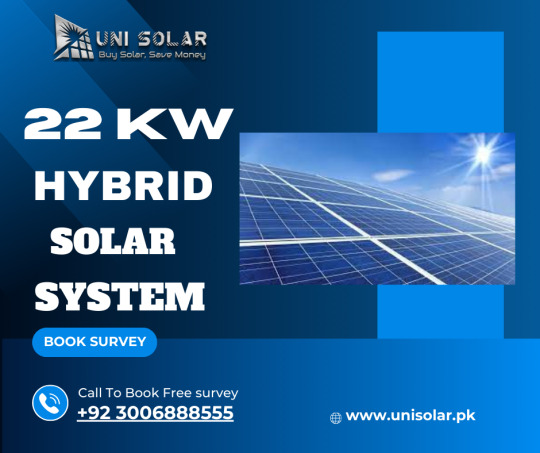#HybridSolarSystems
Explore tagged Tumblr posts
Text
How Hybrid Solar Systems Maximize Energy Efficiency and Savings
In today’s world, where energy demands are rising and sustainability is paramount, hybrid solar systems have emerged as a smart solution for maximizing energy efficiency and reducing electricity costs. Combining the best features of both on-grid and off-grid solar setups, hybrid systems offer flexibility, reliability, and significant savings. But how exactly do these systems achieve enhanced efficiency and cost benefits? Let’s dive deeper.
What Is a Hybrid Solar System?
A hybrid solar system integrates solar panels with battery storage and a connection to the utility grid. This setup allows homeowners or businesses to generate their own power, store excess energy in batteries, and draw from the grid when necessary.
1. Optimized Energy Usage Through Storage
One of the biggest advantages of hybrid systems is the inclusion of battery storage. During the day, solar panels generate electricity, which is used in real-time. Any surplus energy is stored in batteries instead of being sent back to the grid or wasted. This stored power can be used during nighttime or cloudy days, reducing dependency on the utility grid and cutting electricity bills.
2. Reduced Energy Waste
Traditional on-grid solar systems often export excess energy to the grid but without effective storage, users cannot access this power during outages or off-sun hours. Hybrid systems solve this by storing surplus energy, which means less energy wasted and more efficient utilization of every kilowatt generated.
3. Load Shifting for Lower Tariffs
Hybrid solar setups enable load shifting, which means using stored solar energy during peak tariff hours when electricity from the grid is more expensive. By running heavy appliances on stored solar power during costly periods, users save money on their utility bills.
4. Backup Power During Outages
Power outages can be costly and inconvenient. Unlike simple on-grid systems, hybrid solar systems provide uninterrupted power supply by switching to battery-stored energy instantly. This reliability ensures essential devices keep running, reducing downtime and losses.
5. Smart Energy Management
Most hybrid solar systems come with intelligent energy management systems. These monitor energy generation, storage levels, and consumption patterns to optimize when to use solar power, stored battery power, or grid electricity. This smart balancing enhances system efficiency and savings.
6. Lower Demand Charges
Commercial users often face demand charges based on peak electricity usage. Hybrid solar systems help reduce these peaks by utilizing stored solar energy during high-demand periods, effectively lowering demand charges and overall electricity expenses.
7. Long-Term Financial Benefits
Though hybrid solar systems require a higher initial investment due to battery costs, the long-term savings on electricity bills and protection against rising tariffs make them financially attractive. Additionally, many governments offer subsidies or incentives for installing battery-backed solar solutions.
Conclusion
Hybrid solar systems combine solar generation, battery storage, and grid connectivity to deliver unmatched energy efficiency and savings. By optimizing energy use, reducing waste, providing backup power, and enabling smart management, these systems are ideal for anyone looking to maximize their solar investment while enjoying uninterrupted power and lower electricity costs.
0 notes
Text

In the quest for sustainable energy solutions, on-grid solar systems have emerged as a leading choice for homeowners and businesses seeking to harness the power of the sun while maintaining a reliable connection to the utility grid. On-grid solar systems, also known as grid-tied systems, offer numerous advantages, including reduced energy costs, minimal environmental impact, and the flexibility to use solar power alongside traditional electricity. This comprehensive guide will explore the key features, benefits, and considerations for selecting the top on-grid solar systems to maximize efficiency.
#RamRajaSolarEnergy#SolarSolutions#EcoFriendlyEnergy#SustainablePower#SolarTechnology#EnergyEfficiency#HybridSolarSystems#OffGridSolar#OnGridSolar#GreenEnergy
0 notes
Text
Global Exhibition丨SOLARPARTS at OFF-GRID Expo + Conference 2023 and Energaia Montpellier 2023
SOLARPARTS Keep Going Full Steam Ahead
#SOLARPARTS#solarenergy#energíasolar#photovoltaic#solar#Hybridsolarsystems#Grid-tiedsolarsystems#Off-gridsolarsystems#solarModuleManufacturer#EnergySystemSolutionProvider#solar energy#énergiesolaire#energiasolar#energiasolare#solar power
1 note
·
View note
Text
Zip Solar helps Australian homes and businesses embrace clean energy with tailored solar solutions, including hybrid solar systems. Enjoy expert installation, quality products, and ongoing support while reducing costs and protecting the environment. Make the switch today and invest in a brighter future.
0 notes
Text

Transform your energy use with Ideal Solar Power's leading hybrid solar systems. Combining the best of solar and traditional power, our systems ensure efficiency, reliability, and savings. Harness the sun's power while staying connected to the grid for a sustainable and cost-effective solution.
#IdealSolarPower#HybridSolarSystem#HybridSolar#SolarInnovation#CleanEnergy#RenewablePower#EcoFriendlyTech#SustainableLiving
0 notes
Text

22Kw Hybrid Solar System-UniSolar
Discover the energy-saving potential of the 10Kw On-Grid Solar System by Unisolar, a perfect choice for eco-conscious homeowners.
#EcoFriendly#Unisolar#lahore#bestsolarcompany#topsolarenergycompany#solarsystem#solarinstallation#solarinstall#solarinstaller#solarinstallationcompany#Tubewell#agriculture#savemoney#Hybridsolarsystem
0 notes
Photo

SOLAR ADVANCED CERTIFICATION PROGRAM,
Complete Practical Training
.
.
.
.
.
#solarknowledge#solartraining#training#courses#certificationcourse#certificationtraining#certificationprogram#PracticalTraining#pvsystem#offgrid#OngridSolar#Hybridsolarsystem#students#professional#tetsolcertification#tets#tetsol#course
0 notes
Photo

Happy 143rd Birthday of National Poet of Pakistan and Thinker of Pakistan Allama Muhammad Iqbal #GreenEnergy #Ongrid #Offgrid #Hybrid #SolarSystem #RenewableEnergy #5kwsystem #onyx #Hybridsolarsystem #6YearWarranty #25yearwarranty #remotemonitoring https://www.instagram.com/p/CHV7kH4gqh4/?igshid=1bvrpzzne1xbz
#greenenergy#ongrid#offgrid#hybrid#solarsystem#renewableenergy#5kwsystem#onyx#hybridsolarsystem#6yearwarranty#25yearwarranty#remotemonitoring
0 notes
Text
Hybrid Solar Systems for Commercial Buildings: What You Need to Know
With the rising demand for sustainable energy and the increasing cost of electricity, commercial buildings are turning to solar solutions to reduce operational expenses and their carbon footprint. Among the available technologies, hybrid solar systems have gained significant traction for their reliability, flexibility, and energy efficiency.
In this article, we’ll explore everything commercial property owners and facility managers need to know about hybrid solar systems — from how they work to their benefits, costs, and key considerations.
🔋 What Is a Hybrid Solar System?
A hybrid solar system combines the features of both on-grid and off-grid systems. It is connected to the utility grid but also includes a battery storage system to store excess energy. This setup allows commercial buildings to:
Use solar power during the day
Store surplus energy in batteries
Draw power from the grid when needed
Maintain backup during power outages
It provides uninterrupted energy supply, which is essential for businesses that cannot afford downtime.
🏢 Why Hybrid Solar Systems Are Ideal for Commercial Buildings
Here’s why more businesses are choosing hybrid solar solutions:
1. Uninterrupted Power Supply
Hybrid systems ensure continuous power, which is crucial for commercial operations, especially during grid failures or peak load times.
2. Energy Cost Savings
By utilizing solar energy and storing excess for later use, businesses reduce dependence on grid electricity, lowering their monthly bills.
3. Peak Load Management
Stored energy can be used during peak hours when electricity tariffs are higher, helping cut operational costs.
4. Sustainability Goals
Commercial buildings can significantly reduce their carbon footprint and support green building certifications like LEED.
5. Return on Investment (ROI)
With government subsidies, net metering benefits, and reduced energy bills, hybrid systems often deliver a strong ROI within 4–6 years.
⚙️ Components of a Commercial Hybrid Solar System
A typical hybrid setup for commercial use includes:
Solar Panels – To generate electricity from sunlight
Hybrid Solar Inverter – To manage the flow of energy between the solar panels, battery, and grid
Battery Bank – To store excess solar energy
Energy Management System – For smart control, monitoring, and automation
Grid Connection – To import/export energy when needed
💰 Cost Considerations
The cost of a hybrid solar system for commercial buildings depends on:
System capacity (in kW or MW)
Battery type and size (Lithium-ion is more efficient but costlier)
Inverter brand and technology
Installation complexity and location
Monitoring & automation features
✅ Things to Consider Before Installation
Energy consumption pattern – Know your daily load and peak hours
Roof or ground space availability
Battery backup requirement
Vendor’s experience and service support
Local regulations and subsidy eligibility
🔚 Conclusion
For commercial buildings looking to future-proof their energy strategy, hybrid solar systems offer a smart, scalable, and sustainable solution. They not only reduce electricity bills but also ensure reliable backup power, helping businesses run smoothly even during grid outages.
With the right planning and execution, a hybrid solar system can become a long-term asset for any commercial property.
0 notes